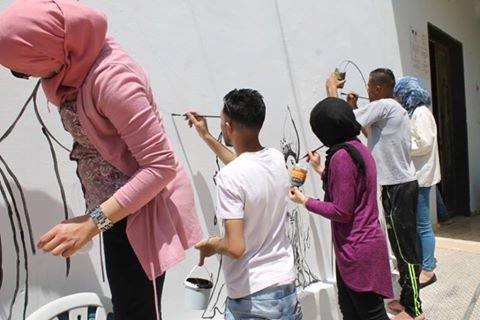Context:
Tunisia has a population of 11.107 million and GDP US$43.015 billion. Youth constitute 12.3% of the total population and 17.5% of the working-age population. While unemployment rate is 14.8%, unemployment among female youth (21.2%) is higher than that among male youth (12.5%). One substantial obstacle for finding a good job is the mismatch between requirements of the job and qualifications of applicants. The average educational attainment in Tunisia is 8.4 school years. Only 10% of Tunisian youth had volunteered in an organization in 2015.
“Be part of the Solution” is a twelve-month program designed under the umbrella of “Tunisian Without Borders” association. This program was built to promote civic participation and democratic values among 70 young men and women in three governorates Gafsa, Kasserine, and Sidi Bouzid. Beneficiaries included media representatives and young artists (poets, slammers, dancers, rappers, and bloggers), aged 18-35 years. The project duration was one year from October 2015 to September 2016.
Implementation of programme/ initiative:
The project was implemented by “Tunisian Without Borders” in collaboration with three associations, the Ministry of Youth, three local radios and different municipalities. The project aimed at increasing awareness in political knowledge, civic participation and democratic values for the target audience. It also aimed at mobilizing project beneficiaries and strengthening their civic participation through advocacy.
Main challenges:
- Inactivity of the Youth Public Houses
- Lack of youth initiatives by the Youth Public Houses
- Lack of dialogue with local authorities in the first phases of the project
Results achieved:
The project started by organizing three local seminars entitled ““Local Democracy: Challenges & Needs” in Gafsa, Sidi Bouzid, and Kasserine, bringing together youth and local authorities to sensitize them about the project and to discuss the challenges of each governorate. Then, it trained 70 beneficiaries (70% women 30 % men) aged 18-35 years in leadership skills, civic engagement and democratic values and encouraged them to implement their acquired skills and knowledge in their cities through an advocacy campaign which sensitized 20 000 citizens. Three local radios in the three governorates conducted biweekly shows and aired for 10 times, inviting the trained youth journalists to participate in the advocacy campaign entitled “The importance of citizen participation and democratic values”. A Graffiti designer led three youth interested in Graffiti in each governorate to paint on walls of Public Youth Houses, supporting the advocacy campaign. In addition, youth dancers, bloggers, slappers, and slammers collaborated and performed a show in the Public Youth Houses. By the end of the project, 70 young leaders from three governorates were able to advocate, attract, manage and lead different groups and be active citizens.
Moving Forward:
“Be part of the solution” project discovered youth who want to make their own associations to improve their communities and to express their voices under an organization that can protect their right. Four female participants adopted the objectives of the project and carried on with it to ensure its sustainability. The youth ended up creating four new associations (Mawjoudin, Ain Tounis, Street Art Organization, and Association for the Strategic Research).
Replicability:
One of the key success factors of the project is playing a mediator role between the youth leaders and the youth in the Public Youth Houses. Other success elements include the persistence to communicate and collaborate with local authorities, youth engagement, adaptability of the activities to match participants’ needs, team spirit, the clear strategy and comprehensive plan of the project, and the transparent and the participatory approach between the project implementer, the stakeholders and the target group.
References:
AHDR 2016
Women’s school-to-work transition in the Arab Mediterranean countries, 2017
OECD Youth in the MENA region, 2016
World Bank, 2016
International Labor Organization, 2016
Report of the national workshop on enhancing youth participation in public issues and decision making in Tunisia
Project Details
Date: October 10, 2017
